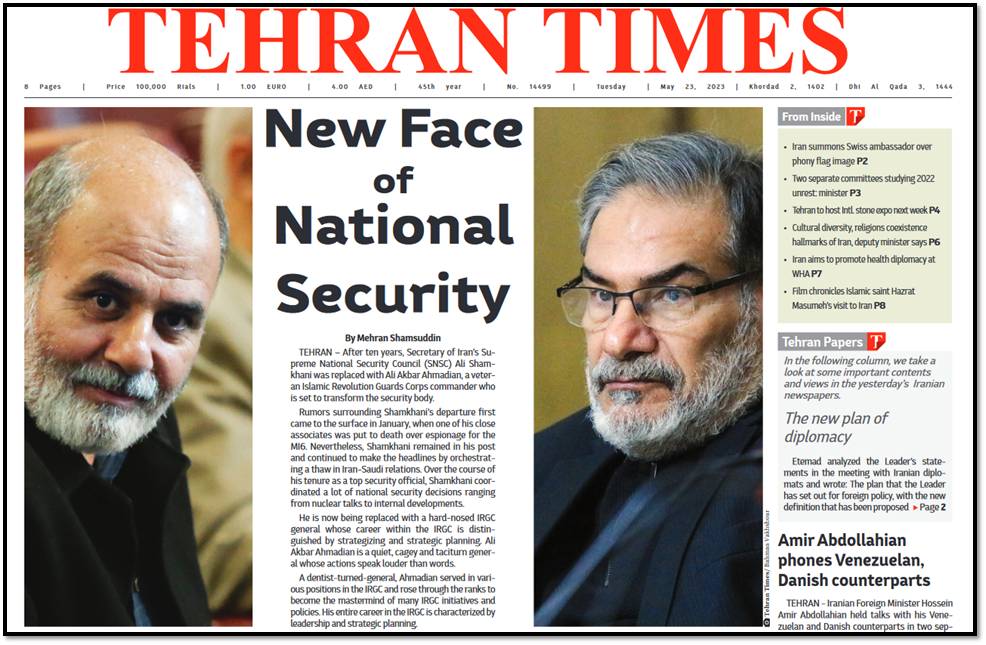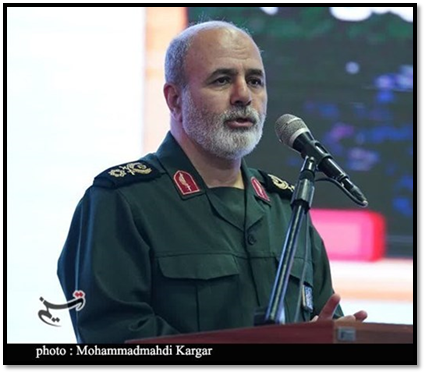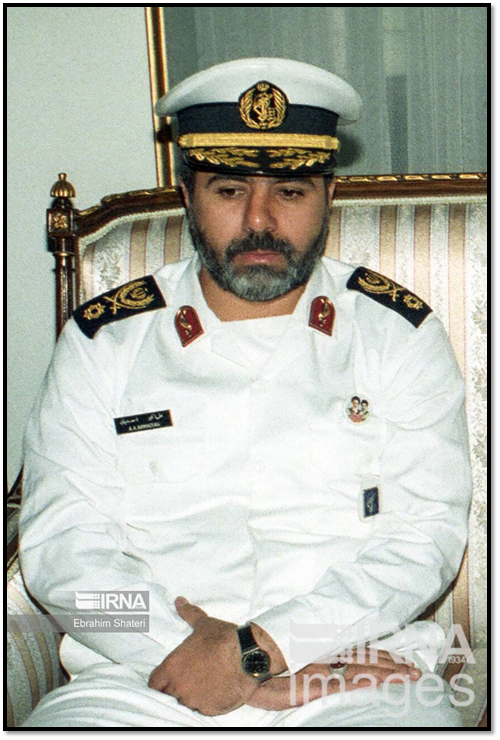Rear Admiral Ali Akbar Ahmadian, a senior officer in the Islamic Revolutionary Guard Corps (IRGC), was appointed to be secretary of the Supreme National Security Council (SNSC), the highest body in charge of foreign policy and national security, on May 22. He replaced Ali Shamkhani, a former rear admiral and defense minister who had held the position from 2013 to 2023. The reshuffle marked the latest consolidation of the IRGC in positions of power.

Both Ahmadian and Shamkhani fought in the 1980-1988 war with Iraq and quickly rose through the ranks. Their trajectories intersected in the 1990s, when Ahmadian served as Shamkhani’s deputy in the IRGC Navy. Both earned the trust of Supreme Leader Ayatollah Ali Khamenei, who named Shamkhani to be his representative on the SNSC in 2013 and did the same with Ahmadian in 2023.
But the two military men were different in several ways. Unlike Shamkhani, Ahmadian had little to no experience with foreign policy or domestic security issues. He spent nearly his entire career in military settings. Shamkhani was not committed to any political camp. Widely considered a pragmatist, he served under three presidents – a reformist, a centrist, and a hardliner.

In contrast, Ahmadian was a “hard-nosed” commander, according to the Tehran Times. He was “a quiet, cagey and taciturn general whose actions speak louder than words.” Ahmadian reportedly sidelined reformist commanders in the IRGC. His appointment to the SNSC, which has only 12 permanent members, could strengthen hardliners in debates. Mohammad Kosari, a member of parliament, expected Ahmadian to push reforms. He is “completely a soldier” of the supreme leader, the lawmaker told local media.
Ahmadian’s appointment could “further strengthen the IRGC in Iran, a process accelerated after President Ebrahim Raisi was elected president in 2021,” Danny Citrinowicz, a fellow at the Institute for National Security Studies in Tel Aviv, told The Iran Primer. Four of Raisi’s 19 cabinet nominees were members of the IRGC, and at least three others had connections to it. Raisi’s predecessor, Hassan Rouhani (2013-2021), had tried to keep the IRGC out of the political realm and reduce its outsized role in the economy. The following is a profile of Ahmadian.
Profile
Accounts of Ahmadian’s life vary. He was born in 1961 or 1962 in Shahr-e Babak in southeast Kerman province. He was reportedly admitted to Tehran University’s dentistry program around 1980 but joined the IRGC after Iraq invaded that year. He served with Qassem Soleimani, who went on to become a national hero and command the elite Qods Force from 1997 until he was killed in a U.S. drone strike in 2020. But the nature of their relationship was unclear. Ahmadian participated in a 1982 operation that led to the expulsion of Iraqi forces from southwestern Khuzestan province. He quickly climbed the ranks and became the IRGC Navy’s chief of staff in 1985.

After the war ended in 1988, Ahmadian served under Shamkhani as deputy commander of the IRGC Navy. Ahmadian promoted asymmetric tactics as a way to counter superior forces, including the U.S Navy stationed in the Persian Gulf. In the late 1980s or 1990s, he completed his dentistry studies and later a graduate degree in strategic management from the Supreme National Defense University of Iran. He also reportedly received a master’s degree in defense sciences.
Ahmadian became commander of the IRGC Navy in 1997. In an open letter, he and 23 other senior IRGC commanders demanded that President Mohammad Khatami (1997-2005) crackdown on the 1999 student protests in Tehran. “We declare that our patience has come to an end, and we will not permit ourselves any more tolerance in the face of your inaction,” they warned.
In 2000, Supreme Leader Khamenei appointed Ahmadian as chief of the IRGC Joint Staff. During two years of his seven-year term, he was simultaneously the dean of Imam Hossein University, which is linked to the IRGC, from 2005 to 2007. Khamenei appointed Ahmadian to be chief of the IRGC Strategic Studies Center in 2007. Ahmadian developed a military doctrine based on asymmetric tactics and Shiism. In 2007, Ahmadian was sanctioned by the United Nations, the United States, and the European Union in 2007 for his role in nuclear and ballistic missile activities.
In 2022, Khamenei appointed Ahmadian to the Expediency Council, a body that resolves constitutional disputes between the Parliament and the Guardian Council. He continued to head the IRGC Strategic Studies Center until his appointment as secretary of the SNSC in May 2023. The following are comments by Ahmadian on key issues since taking office.
On Israel and the Palestinians
In a meeting with Hamas leader Ismail Haniyeh on June 19, 2023: “The Palestinian resistance, which once fought to defend itself in Gaza, has reached a stage of preparation where it is now consolidating its presence in the West Bank.
“The most efficient way to end the more than 75 years of occupation of Palestine is resistance.”
In a meeting with the Secretary General of Palestinian Islamic Jihad Ziad al Nakhala on June 17, 2023: “The expansion of resistance units throughout Palestine will not only shatter the imaginary ambitions of the Zionist regime, but also result in the downfall of the occupying regime… The five-day war [in May 2023] demonstrated that the Zionist regime is declining, while the resistance groups are on the rise… Supporting the Islamic Jihad movement, in line with the aspiration of liberating Palestine, is our duty and we will continue to fulfill it with steadfastness and pride.”
In a meeting with the Secretary General of the Palestinian Islamic Jihad movement Ziad al-Nakhala on June 17, 2023: “The cause of the Palestinian nation and the liberation of holy al Qods (Jerusalem) from the control of the occupier Zionist regime will materialize only through resistance… The enhancement of resistance cells across Palestine will frustrate the imaginary aspiration of the great Israel and mark the downfall of the occupier Zionist regime.”
On Iraq
In a meeting with Iraq’s National Security Advisor Qasim al-Aarji on May 29, 2023: “We expect the Iraqi government to guarantee the security of the country’s common borders with Iran as soon as possible… The will of the Islamic Republic of Iran is to comprehensively expand and deepen relations with neighboring countries, especially the friendly and brotherly country of Iraq.”
On China
In a meeting with Chinese Foreign Minister Wang Yi on July 25, 2023: “In addition to its huge economic benefits, Iran’s cooperation with China sets the ground for regional security as well… [Iran seeks to] strengthen its ties with independent and friendly countries across Asia, particularly China… We believe that multilateral cooperation helps to strengthen regional and international peace and stability, and further sets fertile ground for the protection of global peace and development of nations.”
On Russia
In a meeting with the Aide to the Russian President Igor Levitin on July 4, 2023: “These [global developments] require the two countries [Russia and Iran] to operationalize all routes of the North-South Corridor, the western route, the sea route and the eastern route as soon as possible… Speeding up the implementation of the agreed projects, including the completion of the North-South Corridor and signed memorandums in the field of oil and gas, is one of the most important priorities of the Islamic Republic of Iran in the field of bilateral cooperation with Russia.”
On Brazil
In a meeting with the special assistant to the Brazilian President Celso Amorim on July 25, 2023: “Considering the Islamic Republic of Iran’s principled policy of deepening and promoting relations with independent states, the comprehensive ties with Brazil have a special and significant place in Iran’s foreign policy.”
On economic development
In a speech at a BRICS Friends Conference on July 24, 2023: “Without a doubt, the joining of countries such as the Islamic Republic of Iran, Saudi Arabia, and Venezuela can raise BRICS’s share of the world’s energy reserves to a premium level.”
On cybersecurity
In a speech at a BRICS Friends Conference on July 24, 2023: “Cyber security has a global and regional scope and is not limited to one country, and for this reason, it requires cooperation and interaction between countries aligned with each other in order to protect their security in other areas as well. Another challenge in the cyber field is the use of some countries’ systems and platforms designed by themselves to depend on others, in a new form and format, and as a result interfere in the internal developments of other countries and their security. It is with the abuse of these products that a clear example of such abuse is the platforms of the United States of America. The experience of my country has shown how the Americans have tried to create different types of interventions and insecurities in other societies by using these facilities.
“The lack of fair international laws in the field of cyber space has caused the US government to consider the international cyber space as its sovereign territory by having the global management of the internet and the development of internet platforms such as Google, Twitter, Instagram, etc. To exert influence on the governance of different countries, especially in the field of their national security. The cyberspace of each country, like the frequency space of that country, must be managed exclusively by governments, and the activity of internet platforms, which are generally American, without permission has caused security challenges in different countries, including Iran. Of course, I imagine that many countries participating in this summit also have such experiences.”
Photo Credits: Tasnim News Agency (CC BY 4.0); IRNA
